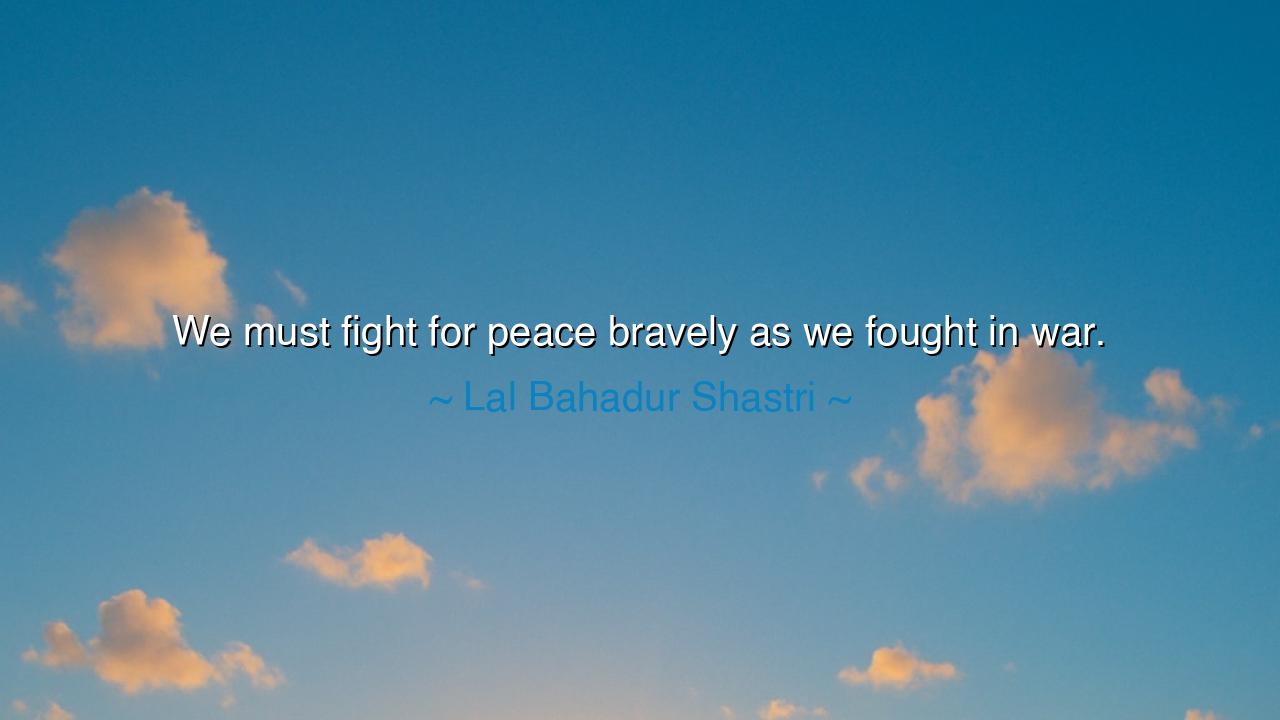
We must fight for peace bravely as we fought in war.






Hear the stirring words of Lal Bahadur Shastri, the humble yet resolute Prime Minister of India, who declared: “We must fight for peace bravely as we fought in war.” These words blaze with paradox and wisdom. For many believe that bravery is reserved only for the battlefield, that courage belongs only to soldiers wielding steel. But Shastri proclaims that the struggle for peace is no less demanding than the clash of armies. Indeed, it requires greater endurance, for war is waged in moments of fury, but peace must be built through generations of patience, forgiveness, and steadfast resolve.
The origin of these words lies in Shastri’s leadership during one of India’s most turbulent times—the Indo-Pakistani War of 1965. He guided his people through the fires of conflict with steady determination, yet he understood that victory in war was not enough. For what is the worth of triumph if it does not lead to lasting peace? Thus he called upon his nation to summon the same courage they had shown in battle and turn it toward reconciliation, harmony, and the building of a future where war would no longer be necessary. In this vision, bravery is not the sole possession of the soldier, but the daily duty of every citizen striving to make peace real.
History itself offers echoes of this truth. After the Second World War, Europe lay in ruins, scarred by hatred and bloodshed. Yet out of the ashes rose a remarkable act of courage—not the courage to wage further wars, but the courage to forgive. Nations that had once sought each other’s destruction joined together to form the beginnings of the European Union. It took bravery to extend the hand of friendship to former enemies, just as much bravery as it had taken to stand against their armies. This was the kind of courage Shastri spoke of: the fight for peace, where the battlefield is the human heart.
Yet let no one think that the fight for peace is gentle or easy. It demands sacrifices that rival those of war: pride must be laid down, vengeance resisted, mistrust overcome. To sit at the table of reconciliation often requires more strength than to ride into battle. For the sword is quick, but peace is slow; war stirs the passions, but peace demands restraint. Shastri’s words are a reminder that to build peace is to stand against the tides of anger, hatred, and suspicion with unyielding courage.
This teaching reaches into our own lives as well. Each of us wages wars within our families, our communities, our workplaces—conflicts of pride, misunderstanding, and resentment. Too often we show courage in defending our honor, but not in laying down our anger. Too often we are brave in argument, but timid in apology. Yet Shastri’s wisdom calls us to a higher standard: to be as brave in peacemaking as we are in defending ourselves. To reconcile requires a heroism of spirit equal to, if not greater than, the heroism of war.
The lesson is clear: true victory is not in the destruction of the enemy, but in the transformation of enmity into friendship. To fight for peace bravely means to work tirelessly for justice, to stand firm against oppression without hatred, and to seek reconciliation where bitterness reigns. It means carrying the spirit of the soldier into the realm of compassion, using the same strength that resists fear in battle to resist the temptations of anger and despair.
Therefore, let Shastri’s words resound in your hearts: “We must fight for peace bravely as we fought in war.” Remember that courage is not only the province of warriors but of all who labor for harmony. Be fearless in forgiving, steadfast in reconciling, bold in your pursuit of justice without violence. For the highest calling of humanity is not to conquer through war, but to conquer war itself through peace. And those who answer this call are the truest heroes, whose victory endures beyond the battlefield, shining in the hearts of generations yet to come.
–––






QBLuong Quoc Bao
This quote makes me reflect on how the efforts put into achieving peace seem so much smaller than the ones dedicated to war. If we could muster the same level of commitment and courage toward peacebuilding, would we see a world that’s more united and peaceful? Or would that commitment, as Shastri suggests, simply reinforce the idea that achieving peace requires forceful action, even when it's for good intentions?
HNHuong Nguyen
Shastri’s statement about fighting for peace reminds me of how people often take peace for granted. If we fought for peace with the same intensity, would we see more proactive efforts in diplomacy and reconciliation? But at the same time, does fighting for peace risk turning it into something combative? Can peace be achieved through peace itself, or does it require some form of conflict resolution and compromise?
NLnhoi loc
I understand the sentiment behind this quote, but it also makes me wonder: Can we really approach peace the same way we approach war? War is driven by conflict and aggression, while peace should ideally be about cooperation and understanding. How do we strike the balance between fighting for peace without resorting to the same violence and division that come with war? Isn’t peace a different kind of struggle?
PNNgoc Anh Pham Nguyen
Lal Bahadur Shastri’s quote really makes me think about how we often approach peace with less urgency than we do war. It’s almost as if we assume peace will just happen on its own. But if we fought for peace with the same dedication and determination as we do in war, would the world be in a better place? What would it take for us to shift our mindset and prioritize peace like that?